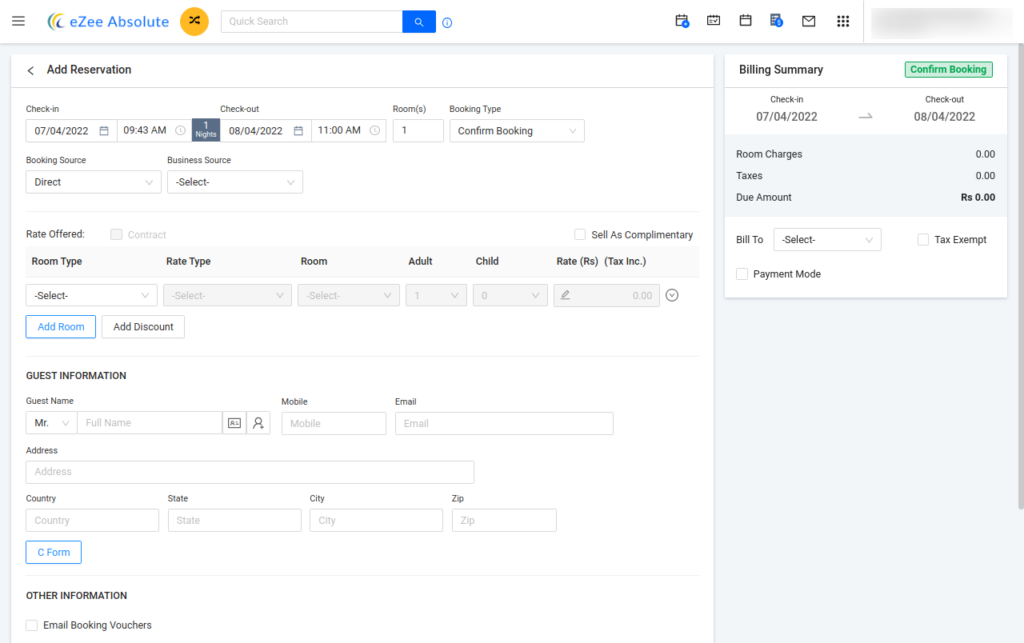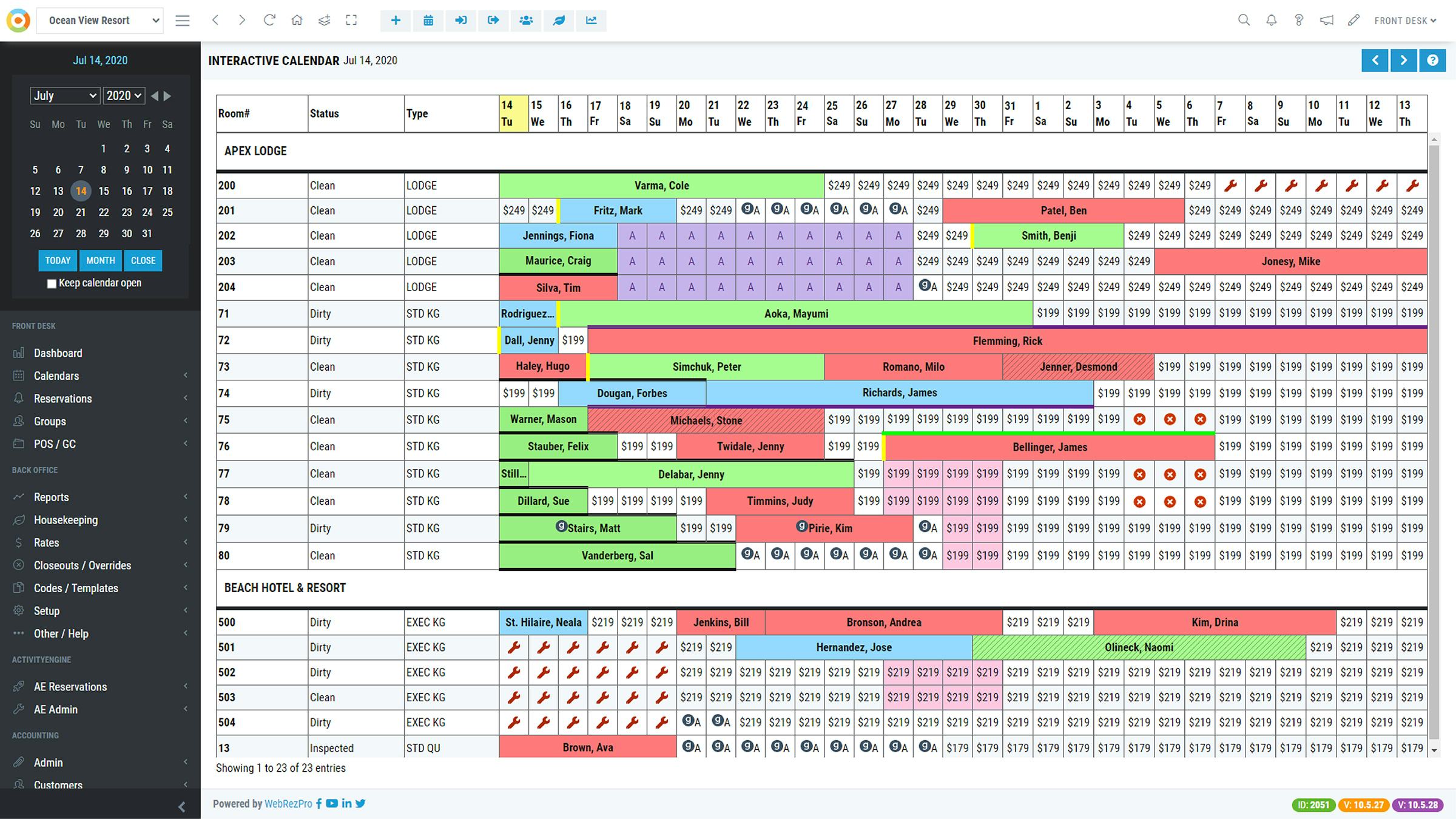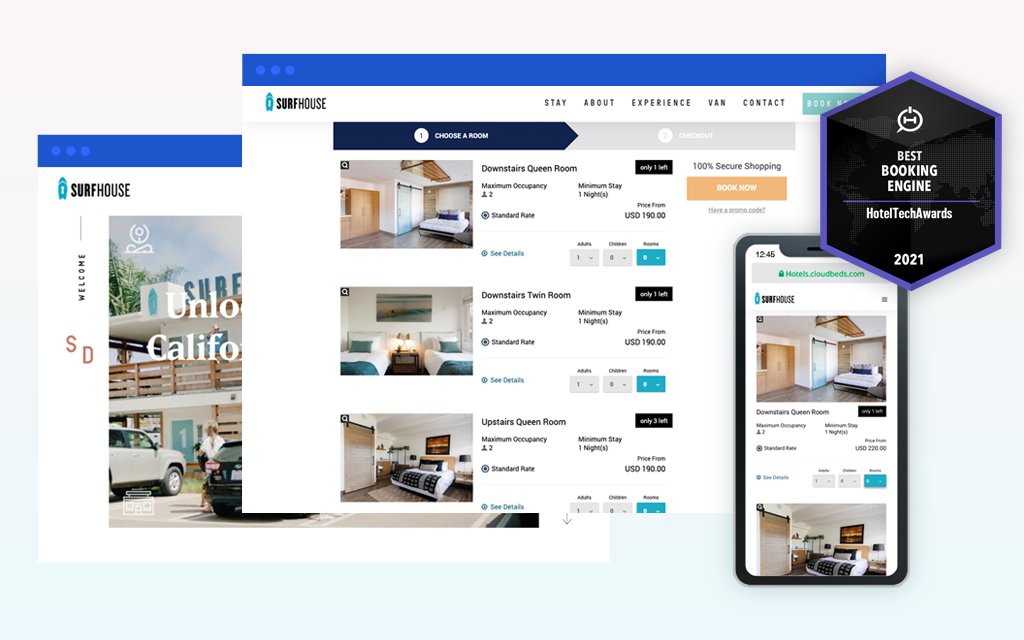Best Small Hotel Booking Software Shortlist
As an industry expert, I've rigorously evaluated countless tools to handpick the best small hotel booking software. Each is primed to tackle your specific challenges and transform your hospitality experience.
- eZee Absolute - Best for robust integrations with OTAs
- Sirvoy - Best for simplicity and user-friendly interface
- Hotel Runner - Best for boosting direct reservations with powerful analytics
- WebRezPro - Best for versatility in accommodation types
- RMS - Best for multi-property management
- Checkfront - Best for incorporating tour and activity bookings
- Lodgify - Best for vacation rentals and B&Bs
- RoomRaccoon - Best for the automated upselling of extras
- Cloudbeds - Best for scalability with growing hotel businesses
- SiteMinder - Best for maximizing global reach with language support
- innRoad - Best for a fully integrated hotel management suite
- Little Hotelier - Best for small hotels and inns with an intuitive design
Navigating the hotel industry can be complex, especially when it comes to managing hotel rooms, handling check-ins, processing credit card payments, and more. That's where small hotel booking software shines. These software solutions, serve as a comprehensive hotel management system, offering a plethora of features, including revenue management and front-office capabilities.
By harnessing these hotel software solutions, you can boost your revenue, enhance the guest experience, and simplify your hotel operations. The primary pain points these tools address involve managing multiple aspects of a hotel's operations. So, if you're keen to elevate your hotel management to the next level, consider exploring the software options I've curated here.
What Is a Small Hotel Booking Software?
Small hotel booking software serves as a digital cornerstone for hotel owners, managers, and operators, particularly those overseeing smaller establishments or boutique hotels. This ingenious tool empowers them to manage room reservations, process payments, handle customer interactions, and gain insights into their business through comprehensive analytics.
Imagine a streamlined hotel PMS that provides a simple-to-use mobile app, advanced reservation software, and even integration with point-of-sale systems. These tools can cater to different room types, making them suitable for motels, hostels, and the best hotels alike. Furthermore, the integration of APIs allows the software to communicate with online travel agencies and social media, enhancing your hotel reservations' reach.
It acts as a central hub, knitting together various operational threads to improve efficiency, boost revenue, and enhance guest experiences. Whether it's keeping track of available rooms, setting dynamic pricing, or facilitating direct online bookings and online reservations, small hotel booking software equips hoteliers to run their business smoothly, maximizing opportunities while minimizing common challenges.
12 Best Small Hotel Booking Software Overviews
1. eZee Absolute - Best for robust integrations with OTAs

eZee Absolute is a comprehensive property management system designed to automate and streamline small hotel operations. As a cloud-based software, it effortlessly handles room bookings, guest management, invoicing, and more, while its prowess in robust OTA integrations is unparalleled.
Why I Picked eZee Absolute:
When selecting a tool for this list, eZee Absolute stood out due to its extensive connectivity with numerous Online Travel Agents (OTAs), a feature that not all competitors can boast of. By offering this, eZee Absolute simplifies the intricate process of managing multiple booking channels, making it an excellent choice for hotels seeking to broaden their digital reach and occupancy rates.
Standout Features & Integrations:
eZee Absolute shines with its user-friendly interface and a rich suite of features such as real-time tracking, automated emails, and mobile accessibility. The true crown jewel, however, is its OTA integrations - it connects to over 100 OTAs including major ones like Expedia and Booking.com, ensuring your rooms get maximum visibility and bookability.
Pricing:
Pricing for eZee Absolute starts from $40/user/month (billed annually). This pricing includes comprehensive access to all its features, and it's recommended for hotels seeking a complete, all-in-one hotel management solution.
Pros:
- Excellent OTA integrations
- All-in-one solution for hotel management
- User-friendly interface
Cons:
- Pricing might be steep for smaller establishments
- Annual billing could be a constraint for some
- Customer service could be improved
2. Sirvoy - Best for simplicity and user-friendly interface

Sirvoy is a powerful hotel reservation system that makes managing your small hotel a walk in the park. It's particularly noted for its uncomplicated, easy-to-use interface, which allows users to navigate through complex operations with ease.
Why I Picked Sirvoy:
I chose Sirvoy for its exceptional user experience, standing out amidst a sea of complex interfaces. As a hotelier myself, I appreciate how vital ease of use is when managing hotel operations. In comparison to other tools, Sirvoy's simplicity and intuitive interface make it a great choice for those who prefer a less complex, more straightforward approach to managing bookings.
Standout Features & Integrations:
Sirvoy comes packed with several features like automated emails, statistics, and reports, a booking engine for your website, and more. Perhaps its most significant edge lies in its capability to integrate with a myriad of services, including WordPress, Joomla, Drupal, and more. It also synchronizes with major OTAs like Booking.com and Expedia, ensuring your room inventory stays accurate across all channels.
Pricing:
Sirvoy's pricing starts from $9/user/month, making it an affordable choice for small hotels. Remember, this is the starting price for the basic plan, and advanced features may require an upgrade to higher tiers.
Pros:
- Simplistic and user-friendly interface
- Affordable pricing
- Useful integrations with popular platforms
Cons:
- Some features are reserved for higher tiers
- Limited customizability in the basic plan
- Customer support might be improved
3. Hotel Runner - Best for boosting direct reservations with powerful analytics

Hotel Runner is a cloud-based hotel management software designed to optimize and streamline hotel operations. Its notable strength lies in its powerful analytics tools, which provide valuable insights to boost direct reservations.
Why I Picked Hotel Runner:
I picked Hotel Runner for its focus on data-driven decision-making. It stands out from the crowd with its strong commitment to analytics, providing insights that help hoteliers make informed decisions to optimize their booking strategies. It's this emphasis on data that makes Hotel Runner an ideal choice for hotels looking to maximize their direct reservations.
Standout Features & Integrations:
Hotel Runner offers features such as channel management, a booking engine, digital marketing tools, and payment processing. However, its analytical tools truly set it apart, providing invaluable data on booking trends, customer behavior, and more. It also offers seamless integration with OTAs, global distribution systems, and hotel operation applications, facilitating efficient inventory management.
Pricing:
Pricing for Hotel Runner starts from $8/user/month. However, the cost can vary depending on the features included in your package, with higher tiers offering more advanced analytical tools.
Pros:
- Powerful analytical tools
- Seamless integrations
- Comprehensive suite of features
Cons:
- Pricing can be complicated
- Some advanced features are only available in higher tiers
- The learning curve may be steep for some users
4. WebRezPro - Best for versatility in accommodation types

WebRezPro offers a comprehensive property management system, supporting everything from small inns to large hotels. With its versatility in handling various accommodation types, it stands out as an adaptable choice for diverse hoteliers.
Why I Picked WebRezPro:
I selected WebRezPro because of its flexibility in accommodating various types of lodging businesses. This adaptability is unique, making it a great fit for properties of different sizes and styles. Its capability to handle various accommodation types makes it stand out as a versatile tool in a market that often pigeonholes properties into specific categories.
Standout Features & Integrations:
WebRezPro features encompass reservations, front desk operations, housekeeping, and accounting, among others. Its direct integration with major OTAs, Global Distribution Systems (GDS), and Meta search platforms is a plus for extending your property's reach. Also, it integrates with a wide variety of payment gateways, POS systems, and lock systems, ensuring smooth operations.
Pricing:
Pricing for WebRezPro starts from $5/user/month (billed annually). Keep in mind this is the starting price and advanced features or add-ons may lead to additional costs.
Pros:
- Supports a wide range of accommodation types
- Extensive integrations with OTAs and other systems
- Comprehensive feature set
Cons:
- Advanced features can increase costs
- Learning curve might be steep for first-time users
- Yearly billing might not suit all businesses
5. RMS - Best for multi-property management

RMS is a cloud-based property management software that provides solutions for single and multi-property hotel businesses. It comes with a centralized dashboard and an array of features tailored to streamline the administration of multiple properties.
Why I Picked RMS:
I chose RMS because of its proficient handling of multi-property operations. This proficiency is particularly useful for businesses managing more than one property. It stands out with its user-friendly interface and a consolidated platform for multiple property management. This multi-property prowess makes it a fitting choice for hoteliers managing numerous properties under one umbrella.
Standout Features & Integrations:
RMS incorporates extensive features from reservations to reporting, with real-time functionality enabling live updates. The system also includes robust integrations with a variety of third-party applications, such as POS systems, CRM, and payment gateways. Crucially, it integrates seamlessly with major Online Travel Agents (OTAs), enabling greater visibility and wider customer reach.
Pricing:
Pricing for RMS starts from $45/user/month. This pricing is for their base plan and doesn't include optional modules or services that come at an additional cost.
Pros:
- Excellent for multi-property management
- Wide array of integrations
- Comprehensive features from reservations to reporting
Cons:
- Additional cost for optional modules
- The interface may seem complex for first-time users
- Higher starting price compared to some competitors
6. Checkfront - Best for incorporating tour and activity bookings

Checkfront is a booking management platform designed to simplify the process of reservation and inventory management for hotels, tours, and activity businesses. Its ability to easily incorporate tour and activity bookings with regular hotel reservations makes it a great fit for hospitality establishments offering such services.
Why I Picked Checkfront:
Checkfront entered my selection because it manages not just typical hotel reservations, but also allows for efficient organization of tour and activity bookings. It differentiates itself with this comprehensive approach towards the guest experience, extending beyond the usual room booking. This makes it particularly suitable for hotels or resorts that provide ancillary services like tours or activities.
Standout Features & Integrations:
The feature list of Checkfront is extensive, including real-time availability, online bookings, centralized reservations, and detailed reporting. Furthermore, it allows the creation of packaged experiences combining accommodation with tours and activities. On the integration front, Checkfront pairs well with various third-party applications including marketing tools, payment gateways, and popular travel marketplaces.
Pricing:
Pricing for Checkfront starts from $49/user/month (billed annually). This price is for their "SOHO" plan, intended for smaller businesses.
Pros:
- Efficient handling of tour and activity bookings
- Extensive feature list
- Wide range of integrations
Cons:
- Price could be high for smaller establishments
- Interface may require a learning curve
- Yearly billing may not suit all businesses
7. Lodgify - Best for vacation rentals and B&Bs
Lodgify is an advanced property management software specifically designed to aid the owners and managers of vacation rentals and Bed & Breakfasts (B&Bs). With its unique feature set tailored to these types of accommodations, Lodgify proves to be a specialized tool for this segment of the hospitality industry.
Why I Picked Lodgify:
I decided on Lodgify for this list due to its clear focus on vacation rentals and B&Bs, a niche that many other property management systems do not cater to specifically. It's not simply a generalized booking system, but rather, a solution built with the unique needs of vacation rentals and B&Bs in mind.
Standout Features & Integrations:
Lodgify's most notable features include its reservation system that can handle direct bookings, a website builder that allows for customization to match your property's branding, and a centralized dashboard for managing multiple properties. In terms of integrations, Lodgify works seamlessly with popular listing sites such as Airbnb, Booking.com, and Expedia, as well as various payment processors for simplified transactions.
Pricing:
Pricing for Lodgify starts from $27/user/month (billed annually). This price includes access to all of their standard features.
Pros:
- Tailored specifically for vacation rentals and B&Bs
- Seamless integration with popular listing sites
- Website builder for customized property branding
Cons:
- Pricing may be steep for individual property owners
- Features may be too specialized for some users
- The user interface may take some time to navigate efficiently
8. RoomRaccoon - Best for the automated upselling of extras

RoomRaccoon is a hotel management software that covers a range of functionality from property management to reservation management and invoicing. It stands out particularly for its automated upselling features, allowing hotels to maximize their revenue by offering guests extras such as room upgrades, spa treatments, or special packages.
Why I Picked RoomRaccoon:
I selected RoomRaccoon for the list due to its distinctive automated upselling capabilities. This feature is quite unique and can contribute significantly to the overall revenue of a hotel. It stands out from other hotel management software options as it not only focuses on efficient hotel operations but also places an emphasis on maximizing income.
Standout Features & Integrations:
RoomRaccoon's key features include an integrated property management system (PMS), booking engine, and channel manager. Its automated upselling feature allows hoteliers to offer guests additional services or upgrades effortlessly, increasing revenue without additional workload. RoomRaccoon integrates well with major online travel agents (OTAs) like Booking.com, Airbnb, and Expedia, and also supports integration with various payment gateways for smooth transactions.
Pricing:
RoomRaccoon's pricing starts at $95/user/month. This rate includes all the essential features needed for efficient hotel management.
Pros:
- Automated upselling feature enhances revenue opportunities
- Integrates well with popular OTAs and payment gateways
- All-in-one solution covering PMS, booking engine, and channel manager
Cons:
- The interface may be complex for some users
- Setup process might be time-consuming
- It's a relatively expensive option for smaller hotels or B&Bs
9. Cloudbeds - Best for scalability with growing hotel businesses

Cloudbeds is a hospitality management software designed to streamline operations for hotel businesses. It incorporates features that assist with managing reservations, distributing inventory, and analyzing performance. Because of its scalability, it is ideally suited for businesses that anticipate significant growth and expansion.
Why I Picked Cloudbeds:
I chose Cloudbeds due to its ability to scale seamlessly with growing businesses. Many management systems struggle when it comes to expansion, but Cloudbeds shines in this area, which sets it apart from its competitors. It allows for easy addition of new rooms or even new properties, making it a reliable choice for growing hotel businesses.
Standout Features & Integrations:
Cloudbeds offers an all-in-one dashboard, a reservation management system, and a robust channel manager to distribute inventory across multiple OTAs. It also includes comprehensive reporting and analytics tools to track business performance and growth. As for integrations, Cloudbeds connects with over 300 applications, including popular platforms like Expedia, Booking.com, Airbnb, and various payment processors.
Pricing:
Cloudbeds offers its services starting from $200 per property per month. This starting price includes all the necessary features to manage a property effectively. (billed annually)
Pros:
- High scalability makes it perfect for growing businesses
- Integrates with a broad range of apps and platforms
- Comprehensive reporting and analytics tools
Cons:
- Might be pricey for smaller businesses or single properties
- The user interface can be complex for new users
- Limited customization options
10. SiteMinder - Best for maximizing global reach with language support

SiteMinder is a guest acquisition platform that aims to maximize the visibility of hotels to potential customers worldwide. By offering support in multiple languages, SiteMinder aids businesses in reaching a diverse, global audience, making it ideal for those wanting to maximize their global reach.
Why I Picked SiteMinder:
I selected SiteMinder for this list due to its robust language support, a feature I found quite appealing. Most platforms offer limited language support, but SiteMinder offers this at an impressive scale, enabling a wider audience reach. This attribute positions it as the top choice for businesses seeking to expand their global reach.
Standout Features & Integrations:
SiteMinder offers features like an intuitive booking engine, distribution channels, direct website and mobile bookings, Facebook bookings, and a global distribution system to reach global markets. Integration-wise, SiteMinder connects with popular platforms such as Expedia, Booking.com, and Agoda, among many others.
Pricing:
SiteMinder's pricing starts from $40 per month per user, providing access to the fundamental features needed to manage a hotel's digital presence effectively. This is the starting price for their standard plan (billed annually).
Pros:
- Extensive language support facilitates global reach
- Integrates with numerous popular platforms for broader distribution
- Offers multiple booking channels
Cons:
- Smaller properties might find the pricing steep
- Could have a steep learning curve for non-tech-savvy users
- Some users have reported delayed customer support responses
11. innRoad - Best for a fully integrated hotel management suite

innRoad is a property management system designed to handle various aspects of hotel operations, from reservations and bookings to guest communications and billing. With its comprehensive feature set, innRoad can serve as an all-in-one management suite, making it an excellent choice for businesses desiring a fully integrated hotel management solution.
Why I Picked innRoad:
I chose innRoad because it provides an all-encompassing platform that facilitates comprehensive management of hotel operations. Many tools focus on singular aspects, but innRoad stands out with its broad functionality, addressing multiple facets of hotel management in one platform. Consequently, it earns the distinction of being "Best for a fully integrated hotel management suite."
Standout Features & Integrations:
innRoad boasts of features like online booking, front desk operations management, housekeeping management, and comprehensive reporting. Moreover, it provides automated scheduling and reservation features that make managing a hotel more straightforward. When it comes to integrations, innRoad connects with popular OTAs, GDSs, and Metasearch channels, providing wider exposure for your hotel.
Pricing:
innRoad's pricing starts from $200 per month per user (billed annually), making it accessible for businesses that prioritize comprehensive hotel management tools. This is the starting price for their 'Independent Hotel' plan.
Pros:
- Provides a comprehensive suite of hotel management tools
- Integrates with popular OTAs and GDSs
- Offers useful features such as automated scheduling
Cons:
- The pricing could be high for smaller businesses
- Requires a learning curve to fully utilize its range of features
- Some users might find the interface outdated compared to competitors
12. Little Hotelier - Best for small hotels and inns with an intuitive design

Little Hotelier is a property management system (PMS) tailored for small hotels, inns, and bed & breakfast establishments. With its straightforward design and easy-to-use interface, it simplifies various aspects of hotel operations, making it the top choice for those desiring an intuitive design for small-scale operations.
Why I Picked Little Hotelier:
I selected Little Hotelier due to its primary focus on small businesses and the simplicity it provides in handling hotel operations. This tool differentiates itself through its user-friendly design, which reduces the complexity often associated with hotel management software. Therefore, I judged it as the "Best for small hotels and inns with intuitive design."
Standout Features & Integrations:
Little Hotelier features include reservation management, front desk operations, and extensive reporting capabilities. It also offers a booking engine that seamlessly integrates with hotel websites to facilitate direct reservations. Regarding integrations, Little Hotelier supports popular OTAs and global distribution systems (GDS), thereby widening a hotel's reach.
Pricing:
Pricing for Little Hotelier begins at $94 per month per user (billed annually). This is the starting price for their 'Bed & Breakfast' plan, which is designed for smaller establishments.
Pros:
- Tailored for small hotels, inns, and bed & breakfast establishments
- User-friendly design and intuitive interface
- Supports direct bookings through its booking engine
Cons:
- Some larger hotels may find the features insufficient
- The pricing could be high for some small businesses
- Limited customization options compared to some competitors
Other Small Hotel Booking Software
Below is a list of additional small hotel booking software that we shortlisted, but did not make it to the top 12. Definitely worth checking them out.
- GuestRez - Good for integrating hospitality operations into a single platform
- Frontdesk Anywhere - Good for hotels seeking an effective online booking engine
- Seven Rooms - Good for personalized guest experience management
- Operto - Good for hotels looking to automate keyless entry
- Hotello - Good for unifying front desk, back office, and client relationship management
Selection Criteria for Small Hotel Booking Software
When choosing the right hotel management software, the specific needs of the hotelier matter significantly. I've personally spent countless hours researching, testing, and comparing various tools in this industry, and I've discovered that certain criteria consistently come to the forefront.
For the tools mentioned here, I placed a strong emphasis on certain key functionality and features that streamline the hotel management process, as well as usability, which can often make or break a software's effectiveness.
Core Functionality
When looking at core functionality, a hotel management software tool should enable:
- Centralized reservations management: Ensure that all bookings, regardless of the source, are managed from a single interface.
- Guest experience optimization: Enhance guest satisfaction with tools that facilitate personalized communication and services.
- Integrated billing and invoicing: Process payments, and handle billings and invoices seamlessly.
- Room and property management: Effectively manage the various aspects of room availability, condition, and general property upkeep.
Key Features
The key features that are particularly crucial in this context include:
- Multilingual support: Catering to a global audience means the software needs to support multiple languages.
- Cloud-based functionality: This allows for flexibility and accessibility from anywhere, anytime.
- Integration with other systems: The ability to integrate with payment systems, CRM, and other hotel tech stack components.
- Real-time data and analytics: For tracking and improving the hotel's performance.
Usability
For usability, we need to consider the following factors:
- User-friendly interface: With a plethora of tasks to handle, hoteliers need software that is straightforward to navigate, with clearly labeled functions and features.
- Training and support: Especially for comprehensive platforms, a robust training program for onboarding users, alongside reliable customer support, is crucial.
- Mobile accessibility: Given the on-the-go nature of the job, mobile access can greatly increase the effectiveness of the software.
- System reliability and uptime: The software should have a proven record of minimal downtime as it could directly affect hotel operations.
People Also Ask
What are the benefits of using small hotel booking software?
Small hotel booking software offers several benefits, including:
- Enhanced efficiency: Automated booking systems reduce manual work, freeing up staff time for other tasks.
- Real-time updates: Availability and booking details are automatically updated to prevent overbooking.
- Improved customer experience: Online booking provides convenience for guests, enabling them to book anytime, anywhere.
- Increased revenue: Features such as upselling or last-minute deals can help to maximize profits.
- Detailed reporting: These tools often provide useful insights and analytics, helping hotel owners to make data-driven decisions.
How much does small hotel booking software typically cost?
Pricing varies significantly based on the features, size of the hotel, and number of users. Some providers offer monthly subscriptions, while others might charge an annual fee.
What are the pricing models for small hotel booking software?
There are typically three main pricing models:
- Per room: The cost is based on the number of rooms available in the hotel.
- Per user: The cost depends on the number of users or staff accessing the software.
- Flat rate: A fixed fee that provides access to all or most features.
What is the typical range of pricing for these tools?
The pricing for these tools can range widely, from around $50/month for the most basic packages to over $200/month for more advanced plans or larger establishments.
Which are the cheapest and most expensive small hotel booking software?
RoomRaccoon tends to be on the lower end of the spectrum, starting at around $55 per month. On the other hand, Cloudbeds, with its extensive feature set and scalability, can be one of the more expensive options, with pricing upon request.
Are there any free small hotel booking software options?
While completely free hotel booking software is rare, some providers offer a free trial period. This allows you to test out the features and usability of the software before making a commitment. Most providers will require payment after this period for continued use.
Summary
In conclusion, small hotel booking software can be a powerful tool to streamline operations, increase revenues, and improve the guest experience. As the market for this software is quite diverse, it's crucial to identify your hotel's specific needs and budget constraints before settling on a particular tool.
Key Takeaways
- Identify your needs: The best booking software for you largely depends on your hotel's specific requirements. Consider factors like the size of your establishment, desired level of automation, and necessary integrations.
- Consider user-friendliness: The ease of use of the software is an essential aspect to consider. Tools like Little Hotelier stand out with their intuitive design, making it easier for staff to manage bookings and handle operations.
- Evaluate cost-effectiveness: While pricing is an important factor, it should be weighed against the software's features and benefits. Some tools may seem expensive at first glance, but their extensive features and scalability can provide excellent value for growing hotels.
What Do You Think?
We hope this guide has been helpful in your search for the perfect small hotel booking software. However, the tech world is always evolving, and new tools are coming onto the market all the time. If you've come across a tool that you think deserves a spot on our list, we would love to hear from you.
Please feel free to suggest any tools that you think we may have missed. Your insights and experiences will help us keep our guide up-to-date and as comprehensive as possible.

